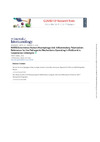Identificador persistente para citar o vincular este elemento:
https://accedacris.ulpgc.es/jspui/handle/10553/36025
| Título: | MAFB determines human macrophage anti-inflammatory polarization: relevance for the pathogenic mechanisms operating in multicentric carpotarsal osteolysis | Autores/as: | Cuevas, Victor D. Anta, Laura Samaniego, Rafael Orta-Zavalza, Emmanuel Vladimir de la Rosa, Juan Baujat, Geneviève Domínguez-Soto, Ángeles Sánchez-Mateos, Paloma Escribese, María M. Castrillo Viguera, Antonio Cormier-Daire, Valérie Vega, Miguel A. Corbí, Ángel L. |
Clasificación UNESCO: | 32 Ciencias médicas 320710 Inmunopatología 320102 Genética clínica |
Palabras clave: | Transcription Factor Mafb Set Enrichment Analysis Gene-Expression Gm-Csf Langerhans Cells, et al. |
Fecha de publicación: | 2017 | Publicación seriada: | Journal of Immunology | Resumen: | Macrophage phenotypic and functional heterogeneity derives from tissue-specific transcriptional signatures shaped by the local microenvironment. Most studies addressing the molecular basis formacrophage heterogeneity have focused onmurine cells, whereas the factors controlling the functional specialization of human macrophages are less known. M-CSF drives the generation of humanmonocyte-derived macrophageswith a potent anti-inflammatory activity upon stimulation. We now report that knockdown ofMAFBimpairs the acquisition of the anti-inflammatory profile of human macrophages, identify the MAFB-dependent gene signature in human macrophages and illustrate the coexpression of MAFB and MAFB-target genes in CD163(+) tissue-resident and tumor-associated macrophages. The contribution of MAFB to the homeostatic/anti-inflammatory macrophage profile is further supported by the skewed polarization of monocyte-derived macrophages from multicentric carpotarsal osteolysis (Online Mendelian Inheritance in Man # 166300), a pathology caused by mutations in the MAFB gene. Our results demonstrate that MAFB critically determines the acquisition of the antiinflammatory transcriptional and functional profiles of human macrophages. | URI: | https://accedacris.ulpgc.es/handle/10553/36025 | ISSN: | 0022-1767 | DOI: | 10.4049/jimmunol.1601667 | Fuente: | Journal of Immunology [ISSN 0022-1767], v. 198 (5), p. 2070-2081, (Marzo 2017) |
| Colección: | Artículos |
Citas SCOPUSTM
54
actualizado el 08-jun-2025
Citas de WEB OF SCIENCETM
Citations
56
actualizado el 22-feb-2026
Visitas
14
actualizado el 10-ene-2026
Descargas
6
actualizado el 10-ene-2026
Google ScholarTM
Verifica
Altmetric
Comparte
Exporta metadatos
Los elementos en ULPGC accedaCRIS están protegidos por derechos de autor con todos los derechos reservados, a menos que se indique lo contrario.
